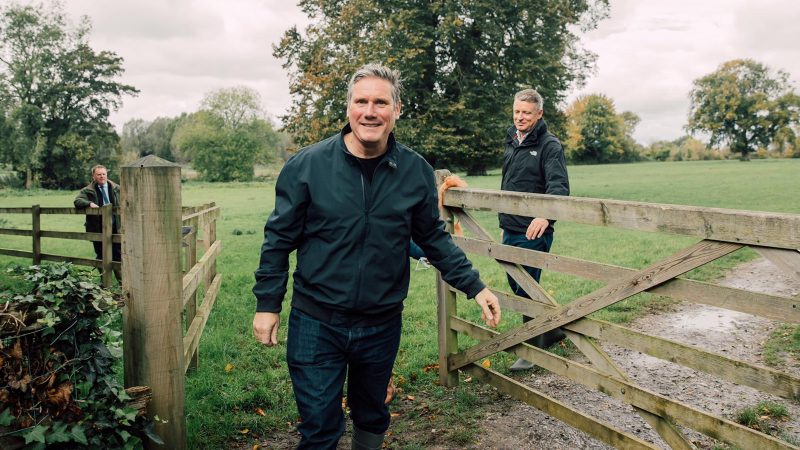
Keir Starmer will promise to bring his party closer to rural and farming communities, with the key message that “farming matters to Labour”, in the first speech by a Labour leader to the National Farmers’ Union conference since 2008.
Addressing the organisation on Tuesday, Starmer will call on the government to encourage people to buy more British food, address the serious and growing problems with farm payments and invest in agricultural skills.
He will announce that he has tasked Labour’s environment, food and rural affairs lead Luke Pollard to oversee a review of the party’s rural policy and to highlight Labour’s drive to protect Britain’s high food and farming standards.
The party leader will also say that “Labour’s history owes as much to the countryside as it does to the city” and the “perceived distance that’s grown up between Labour and the countryside” cannot be ignored.
“It’s more perception than reality, because in the last year Labour stood with British farming and stood up for rural communities, from fighting for high food standards to protecting family farms,” Starmer will add.
The Labour leader demanded in October last year that Boris Johnson “back British farmers” by supporting plans to protect the UK from lower-standard food imports ahead of the Brexit transition period ending.
Labour has repeatedly argued that the government refused to protect the country’s food standards ahead of leaving the EU, despite the Tory 2019 manifesto celebrating the “high standards” of British farming.
MPs voted down Labour-backed amendments to the agriculture bill in October that sought to uphold British food and animal welfare standards in future trade deals. The opposition accused the government of only supporting farmers “when the sun shines”.
Starmer will tell the conference tomorrow: “No party can claim to represent the country if we don’t represent the countryside. Let me begin by reminding us all that Labour’s history owes as much to the countryside as it does to the city.
“Keir Hardie, my namesake and the first Labour leader, was the son of a farm worker. The post-war Attlee government introduced the Agricultural Wages Board and passed the 1947 Agriculture Act that shaped farming for decades to come.
“And it’s a little-known fact that my first holiday job, at the age of 14, was on one of the local farms near where I lived. Farming matters, to Labour, to the British people, and to the families and communities that make farming possible.”
In a speech last week, Starmer set out his vision for the economy, during which he called for the government to introduce a ‘British recovery bond’. He is expected to outline tomorrow what that would mean for rural communities.
He will explain that he visited South Yorkshire last year to see how local communities had been rebuilding after the 2019 floods. “I met families who had seen their homes destroyed, their businesses closed,” he will say.
“Their resilience was amazing. But what shocked me most was that many of those families had come to accept that every few years this kind of thing could happen. That creates a permanent insecurity. And huge damage to local economies.”
Starmer will argue that “we have to change this” and, stressing the need for long-term investment, that government must see flooding “not as an emergency to respond to year after year but as a crisis to prevent”.
He is set to say: “This kind of investment – long-term, green, targeted at areas starved of government funding for a decade, and designed to build security, resilience and prosperity for the future – is exactly what I have in mind when I say that recovery bonds could be used to build the infrastructure Britain will need in the decades to come.
“And it’s what I mean when I say this has to be a recovery that works for all parts of the economy and all parts of our country.”
Voters in rural and coastal communities are considered a key target by the party. Luke Pollard has said there is “no path to power that doesn’t see us winning seats in rural, semi-rural and coastal communities”.




More from LabourList
‘Labour is being badly misled on housing’
Reeves bets on patience over populism
‘Energy efficiency changes must work for older private renters’